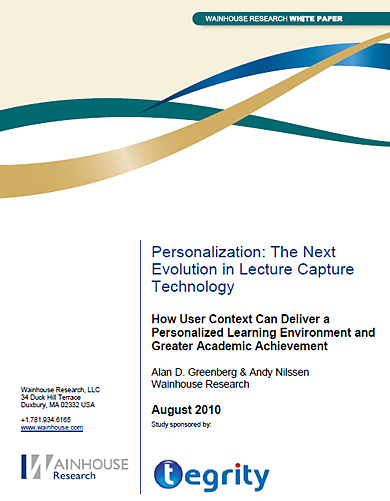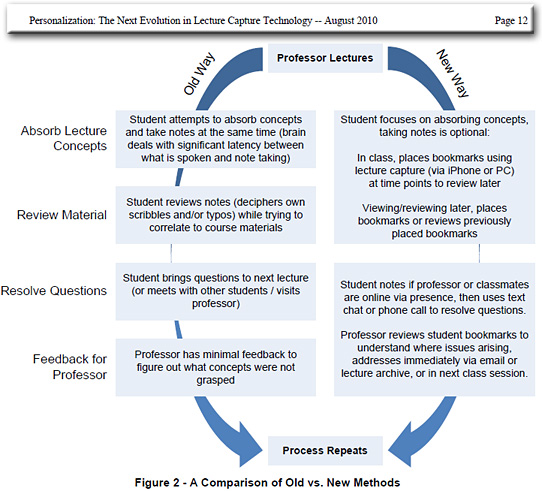From DSC:
I was reading a white paper from Tegrity today (see below graphics). It mentioned that the next frontier for lecture capture technologies is focused on developing more personalized learning experiences.
.

.

.
— A brief aside from DSC:
Reminds me of some of the functionality found in Livescribe’s echo smartpen.
.
The ability to integrate lecture capture platforms with Learning Management Systems (LMS’s) can help to automate the authentication and authorization needed to ensure learners get to review what they are allowed to review. Integration hooks provided by lecture capture and LMS vendors are viable as methods of ensuring a baseline approach to secure access. Yet most lecture capture systems do not know who the viewer is (as the LMS does the authentication and authorization); they only know that the stream is permitted to play and that students of the course are watching.
This sets the stage for the next transformation of lecture capture solutions – into platforms that can understand not just who their users are, but also what those users need to do and how their experience can be personalized and enhanced.
The coming shift will bring creation of custom learning environments that cater to the individual student by offering personal context-sensitivity, the ability to draw on the knowledge of peers and instructors, and the ability to better manage and monitor each individual learner’s behaviors and customize their experience to their individual needs. Among the major effects of this shift:
- Democratization of the content creation process as learners themselves contribute to or otherwise use lecture capture tools to learn from or teach others
- Faster learning by enabling learners to access information more quickly through bookmarks – and placing efficiencies within the platform to streamline teaching and learning
- Changing impact on educators, who can rely on lecture capture feedback loops based on features like bookmarking to enable them to adjust content and teaching styles to suit learner needs
- Use of presence and the fact that a system can know a learner to automate and make more efficient the act of finding peers or instructors for further learning interactions
- Greater ability to deliver content and offer customized features via mobile devices
This white paper focuses on the evolution of lecture capture as a tool for creating a coherent environment for learner-centered instruction, showing the possibilities for improved efficiencies and better learning outcomes.
From DSC:
The integration of a lecture capture system w/ an LMS got me to thinking…what if each person in the world had a constantly-updated, adaptive, web-based learner profile that detailed their current age, current and past places of residence, language(s), hobbies, interests, courses taken, major(s), minor(s), last grade completed, which RSS feeds they subscribe to, which sources of educational content they prefer, etc. Given permission by the student, a vendor’s tool could then query the database and look for particular fields…plugging that content into their own application for greater context and engagement.
So if a 3rd grader in India loved horses, the math problems could utilize that information to make the problems more engaging to that person.
Hmmm…along these lines, I think I’ll set up some Google alerts to include:
- Multi-agent systems
- Adaptive learning systems
- Artificial intelligence education
- Distributed e-learning systems
- Semantic web education
- Learning agents
- Intelligent tutoring
- Online tutoring
The next few years should be veeeerrrryyy interesting. Fasten your seatbelts!












